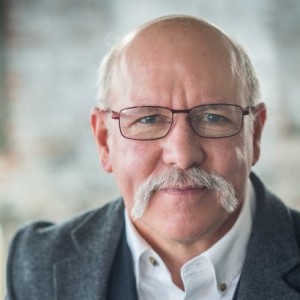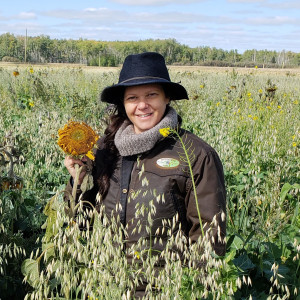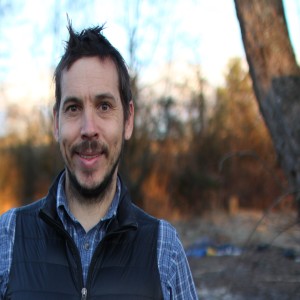Episodes

Tuesday Nov 17, 2020
Tuesday Nov 17, 2020
On this live edition of Tractor Time — recorded on November 12 — we are joined by Jeff Moyer, CEO of the Rodale Institute. Jeff has a new book out from Acres U.S.A. It’s called Roller/Crimper No-Till: Advancing No-Till Agriculture — Crops, Soil & Equipment.
For nearly 30 years, Jeff has worked at the Rodale Institute in Southeastern Pennsylvania, where he’s designed equipment and techniques for organic no-till farming systems. Just last year, he was named CEO of Rodale. In addition, he has served as the chairman of the USDA’s National Organic Standards Board and was a founding board member of Pennsylvania Certified Organic.

Monday Oct 12, 2020
Monday Oct 12, 2020
Ken Roseboro, the editor and publisher of The Organic and Non-GMO Report, has been called “the nation’s reporter on all issues surrounding genetically modified foods” by Acres USA magazine. Ken’s articles have appeared in leading food and agriculture publications and websites such as Civil Eats, Sustainable Food News, Prepared Foods, Natural Foods Merchandiser, Food Processing, and World Grain as well as Harvest Public Media, The Huffington Post, Yahoo News, Mother Earth News, and others. He is a contributing editor to EcoWatch, Organic Connections and New Hope 360. Ken is author of Genetically Altered Foods and Your Health and The Organic Food Handbook both published by Basic Health Publications. He has spoken at many conferences including Natural Products Expo West, All Things Organic, Acres USA Conference, The Organic Farming Conference, National Heirloom Seed Expo, and others. Ken is a member of the design team of the Non-GMO Supply Working Group and a founding member of the board of directors of the Iowa Organic Association. Ken also serves on the board of directors of Soil Technologies Corporation. He appears in the award-winning documentary film, GMO OMG. In 2006, Ken received an Award of Merit from Seed Savers Exchange for his efforts to preserve genetic diversity through his publications.
1 hour, 3 minutes

Thursday Sep 03, 2020
Thursday Sep 03, 2020
With us on our first live episode of Tractor Time is agroecologist Nicole Masters. She has a new book out. It's called, "For the Love of Soil," and there's an excerpt of that book in the August edition of Acres U.S.A. magazine. Go to acresusa.com to subscribe. Nicole has 20 years of experience working in Australia and New Zealand, in North America, to create regenerative food systems.

Friday Jul 31, 2020
Friday Jul 31, 2020
On this episode of the Tractor Time podcast, we're joined by Chris Smith, author of the James Beard Award-winning book, “The Whole Okra: A Seed to Stem Celebration.” Chris lives in Asheville, North Carolina, where he is the founder and executive director of The Utopia Seed Project.
It seems like a perfect time of year to talk about okra. And I have to say that okra is one of my favorite vegetables. I grew it back when I lived in Texas, and it is just a stunningly beautiful plant. It loves the heat. It’s drought tolerant. I loved serving it at dinner parties because people were always surprised it could be so good.
But, let’s face it. Okra is polarizing. There’s the slime, for one. At the grocery store, you find it in a can, which, no thank you.
But beyond all that, it turns out okra is a powerful vehicle for telling stories about genetic diversity, seed to stem eating and even the American slave trade. Chris weaves all that, and much more, into his book.

Saturday Jun 27, 2020
Saturday Jun 27, 2020
Rebecca Burgess is the co-author of the new book Fibershed: Growing a Movement of Farmers, Fashion Activists, and Makers for a New Textile Economy. Her previous book was Harvesting Color: How to Find Plants and Make Natural Dyes.
If you listen to Tractor Time, then you likely care about where your food comes from and how it’s grown. But if you’re like us, clothing doesn’t always get the same consideration. We often talk about farm to table, but not farm to closet.
All of us buy clothing. We buy for comfort, for style, for status, for functionality. We have the brands we stick with. And, yes, sometimes we’ll spend a little extra for a garment made of something we feel virtuous about — an organic cotton t-shirt, maybe, or a pair of hemp slacks. But mainly, we look for things that look good, won’t wear out too quickly and protect us from the elements. But what is this often-opaque global supply chain of fast fashion really doing to our world and to us? What Rebecca describes in this interview and in her book is truly stunning and might just change the way you think about clothing forever.
As you listen to this interview, I suggest you do some laundry, or at least take a look in your closet. Are you as conscientious about your clothing as you are about your food?
In this conversation, Rebecca opens up her closet, somewhat literally, to us, and shines a bright light on a system that takes an enormous toll on our environment. She isn’t just exposing a broken system, however — she has a bold and hopeful vision for what a regenerative clothing system could look like. And it isn’t just about persuading big clothing brands to do the right thing. Her Fibershed movement is well underway, with more than 50 communities already participating.
Rebecca is the executive director of Fibershed. You can find out more about it at fibershed.org. Rebecca is also the chairwoman of the board for the Carbon Cycle Institute and a skilled weaver and maker of natural dyes.

The Voice of Eco-Agriculture
Founded in 1971, we strive to be lifelong educational partners for farmers, ranchers and growers of all kinds. We strongly believe to farm economically, you must farm ecologically.
Learn more at www.AcresUSA.com




